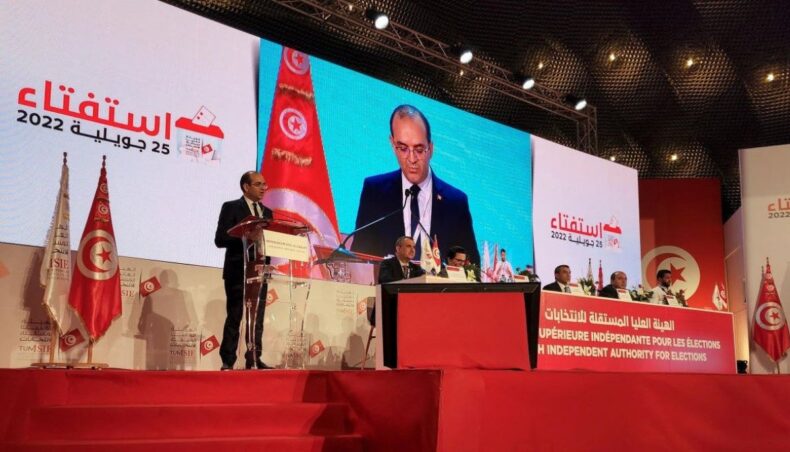The Tunisia opposition claims that President Kais Saied’s fragility is demonstrated by the low turnout for the constitutional referendum.
The country’s opposition claims that the low turnout of only approximately 30% demonstrates the president’s weakness and the legitimacy of the process, despite the fact that the results reveal that Tunisians have approved the new constitution put forth by President Kais Saied.
94.6 percent of voters approved the constitution, according to preliminary data released on Tuesday evening by the Tunisian Independent Higher Election Authority (ISIE).
Before the final outcome is declared at the end of August, an appeals process lasting a month will now take place.
The opposition in Tunisia had called for a boycott of the election and claimed that the low turnout was due to the country’s transition from a hybrid parliamentary system to one that is hyper-presidential and removes many checks and balances.
After several members of the opposition emphasized that the majority of Tunisians did not only not vote for Saied, but also did not participate in his referendum process.
Farouk Bouasker, the president of the ISIE, avoided talking about voter participation.
The new constitution, according to Saied, will maintain the freedoms guaranteed in the 2014 version while making the “corrupt” political class less powerful. Saied stated on Monday that people were allowed to forgo the referendum.
The populist, who took office in 2019, still enjoys a sizable base of support from Tunisians fed up with the political and economic woes that have plagued the nation since the 2011 revolution. Still, that support has declined since he suspended parliament and toppled the government in July.
Up to the December legislative elections, Saied will be authorized to rule by decree.
‘Worries and Inquiries for Tunisia’
In a news conference, Nejib Chebbi, a leading member of the opposition National Salvation Front, said low turnout “de-legitimizes the overall process”.
His comments were echoed by the founder of the US-based Center for Research of Islam and Democracy, Radwan Masmoudi.
A new constitution for Tunisia cannot be approved or adopted with less than 30% of the vote, he told Al Jazeera. The ISIE was under Saied’s influence, particularly in the interior of the country, and falsified the results in his favor as was expected. However, the actual numbers are far lower.
Many have questioned the veracity of the results and the official turnout, especially given the dearth of election observers present.
The referendum has had relatively little response on a global scale.
Ned Price, a spokesman for the US Department of State, stated that Washington was aware of concerns held by politicians and civil society organizations regarding the lack of an “inclusive and transparent process” and the restricted opportunity for genuine public discussion during the drafting of the new constitution.
We also have worries about the new constitution’s reduced checks and balances, which could jeopardize the defense of fundamental liberties and human rights, the speaker continued.
‘Support for Saied’
Polls have consistently shown that Saied would remain the most well-liked presidential candidate for Tunisia if a vote were to be called, despite a substantial decline in his popularity rating.
Political analyst Amine Snoussi told Al Jazeera that Saied is simply more powerful politically than the others, not because he is popular. That implies that there is political room for additional players to establish and profit from.
The future of their children or grandchildren was the main concern of the voters Al Jazeera spoke to at the polling places prior to the results being tallied. Many have high hopes for Saied and believe he will fundamentally alter the nation.
However, Snoussi worries about what might occur now that Saied holds all of the state’s authority in his hands.
I believe he will continue to reign as he has for the past year, but now that he has the law at his disposal, he has all the tools necessary to impose an authoritarian system, the man said.













